Neoliberalism's Children. India's Economy, Wageless Life, and Organized Crime in The Moor's Last Sigh
Keywords:
neoliberalism, globalization, wageless life, Salman Rushdie, The Moor’s Last SighAbstract
As a comment on India post-Midnight’s Children, Salman Rushdie’s 1995 novel The Moor’s Last Sigh offers a broad-based critique of modern India within the context of economic policy shifts in India following independence from British rule in 1947. The gradual implementation of neoliberal economic policies in the 1980s and 1990s accompanied India’s emergence as a major player in the global capitalist economy but also led to drastic increases in income inequality, unemployment, and the proliferation of a vast informal sector of exploitable human capital. Rushdie's novel identifies India's entrepreneurial and capitalist classes, specifically in Mumbai/Bombay, as complicit in the exacerbation of class disparity which has led, in many cases, to increased Hindu-Muslim cultural tensions and the growing ubiquity of government corruption and organized crime. The novel offers additional insight into the exploitative logic of Hindu nationalist politics through its parodic depiction of the Shiv Sena party, which owes much of its political clout to the maintenance of a patriarchal, mafia-esque relationship with urban slum-dwellers. The Moor's Last Sigh delineates new and complex forms of oppression and exploitation in postcolonial India that often occur simultaneously along class and cultural lines.


